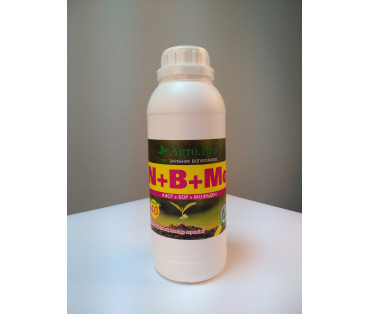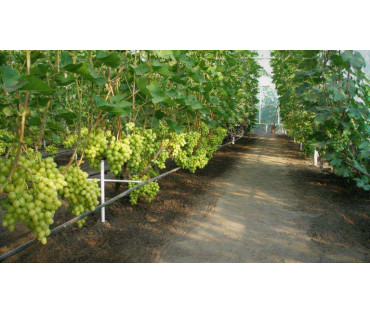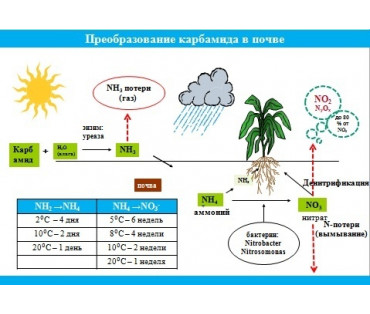Nitrogen (N) increases yields and is absorbed in the form of ammonia or nitric acid
Nitrogen (N) is one of the most important major nutrient element for the plant, which increases yields and is absorbed in the form of ammonia or nitric acid (only legumes have the ability to absorb atmospheric nitrogen with nodule nitrogen-assimilating bacteria), therefore, the need for nitrogen fertilization is constant. Nitrogen takes an active part in the process of biosynthesis of proteins (the proteins formation), affects the growth and development of agricultural plants (activates the growth of vegetative organs - stems, leaves), increases the protein content in reproductive organs (fruits, seeds); the main part is in the enzymes, proteins, nucleic acids (DNA, RNA), as well as chlorophyll, vitamins, alkaloids; it increases the level of digestibility from the soil of such elements as potassium, phosphorus, calcium, manganese, magnesium, molybdenum, copper.
Young plants are most in need of nitrogen, in particular various sorts of seed cabbage (white cabbage (late, early), red cabbage, and Brussels sprout), asparagus, leek, pumpkin, celery, rhubarb. Agriculture plants consume a significant portion of nitrogen from the soil during cultivation period (grain crops - 100-150 kg / ha, vegetable plants - 150-50 kg / ha).
Nitrogen deficiency: when the amount of nitrogen in the soil is insufficient, the growth slows down (leaves reduce), the vegetation period shortens, the plant's flowering weakens (the initiation of a smaller number of fruit buds); plants lose intense green coloration to pale green color (the chlorophyll formation is violated, chlorosises appear), flavescence and early falling of leaves start; cereal croppers have weak tillering, vegetable croppers obtain old leaves of yellow-green color, fruit and berry – red leaves; a large part of the fruit become small with a dense pulp, abscission of fruits starts after the ovary, which leads to a decrease in yield.
Abuse of nitrogen nutrition: leads to accumulation of nitrates in vegetable crops. When nitrogen is exceeded, the useful substances from the generative organs of the plant flow to vegetative, which leads to excessive formation of herbage, while the processes of yield ripening slow down, the quality of grown products decays (for cereals it leads to the lodging crops, for vegetables – to weak development of the root system, tubers, fruits, for melons and vegetables – to accumulation of nitrates, for young fruit trees – to reducing of frost resistance). Nitrogen fertilizers are the most dangerous when norms are exceeded.
Nitrogen interinfluence with other elements
| Antagonists (overbalance of one triggers a deficiency of another element) | Synergist (improve mutual properties of each other) | Block the each other interaction (it is not recommended to combine together) |
| - | P (phosphorus), K (potassium), Ca (calcium), Mg (magnesium), Mo (molybdenum) | - |
Related Products
Nitrogen + Bor + Molybdenum «Agro.Bio»
The importance of nitrogen in plant life can hardly be overestimated. It is the main macronutrient, due to which the vegetative mass of the plant increases. Nitrogen plays the role of the main buildin..
$11.00
Related Articles
Influence of Totem Agro.Bio on the development of grape seedlings
Agro.Bio pays great attention to the further development of viticulture. To successfully solve the problems of developing viticulture, it is of great importance to increase the yield of first-class..
The ability of plants to tolerate excess nitrogen and high temperatures
On the nature of the influence of organomineral, humic microfertilizers Mind Extra "Agro.Bio", Totem "Agro.Bio", Adept "Agro.Bio", Potassium Humate + Phosphorus "Agro.Bio" on the ability of plants to ..
Effect of Humic and Fulvic Acids on Phosphorus Uptake in Plants Depending on Environmental Temperature
The stimulating effect of humic and fulvic acids on plants has been noted by various scientists, including specialists from the mineral fertilizer manufacturer Agro.Bio, but the ..




-370x314.jpg)